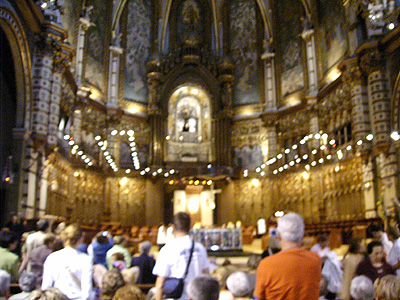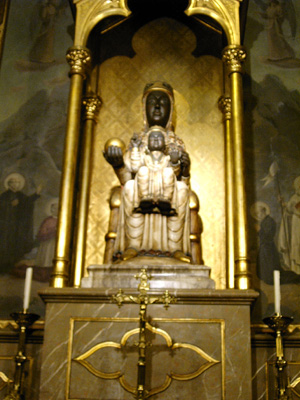 |
||||||||||
 |
||||||||||
|
1316: Basilica at Montserrat, Catalonia, Spain Mystery Worshipper: Erma Hamre. The church: Basilica at Montserrat, Spain. Denomination: Roman Catholic. The building: There has been a church at Montserrat since the ninth century. The basilica dates from 1592 but was destroyed by Napoleon's troops in 1811; the present building is a reconstruction dating from the late 1800s. It stands as part of a complex of religious buildings including a Benedictine monastery. The basilica is famous for its unusual statue of the Mother of God known as the Black Madonna (see picture below). Legend has it that the statue was carved by the evangelist St Luke and brought to Montserrat by St Peter. In 1881 the statue was crowned by Pope Leo XIII, who proclaimed Our Lady of Montserrat patron saint of Catalonia. The church: The basilica is administered by a community of 80 Benedictine monks. Forty were present for the mass; the others must have been ministering elsewhere. The neighbourhood: The area around Montserrat consists of sedimentary rock and is one of great scenic beauty. It has been known as a holy place since the year 880, when young children reported hearing music and seeing bright lights in the hills at night. When their parents, at first sceptical, witnessed the same phenomena, they explored the region and stumbled upon the statue of the Black Madonna hidden in a grotto. The bishop decreed that it should be moved to a nearby village. However, according to legend, the small wooden figure suddenly became so heavy that it could not be lifted; this was interpreted as a sign from the Blessed Mother that the statue was to remain at Montserrat. The cast: The abbot was the celebrant. Other priests and brothers shared readings, intercessory prayers, homily, and music duties. The date & time: Wednesday, 24 May 2006, 11.00am. What was the name of the service? Main daily mass. How full was the building? Full – about 500 people. Did anyone welcome you personally? No. Most of the worshippers appeared to be Catalonian senior citizens, youth on field trips, and other pilgrims. Was your pew comfortable? The pews were wooden bench style, with padded kneelers. Pews are relatively temporary furnishings in a marbled-floor basilica. How would you describe the pre-service atmosphere? Signs admonished visitors to keep silence, but the natural atmosphere of respect was sufficient. What were the exact opening words of the service? "In the name of the Father and of the Son and of the Holy Spirit." What books did the congregation use during the service? The monks had prayer books, song books and lectionaries, but none were provided for the general public. What musical instruments were played? Pipe organ. Did anything distract you? I was distracted by the thought that the famous Black Madonna stood only metres away, reachable via a stairway near the altar. I also couldn't help but recollect the tragedies wreaked by Napoleon and, more recently, during the 1936-39 civil war. Was the worship stiff-upper-lip, happy clappy, or what? Stiff, yes. Clearly reverent – everyone knew the mass parts. During the peace ceremony most of the congregation made eye contact with each other, and the universal sign of peace was universally flashed about.  Exactly how long was the sermon? Seven and a half minutes. On a scale of 1-10, how good was the preacher? 3 – I didn't understand a word of it, as it was in Catalonian, but the pilgrims stared straight ahead and no one seemed visibly touched. In a nutshell, what was the sermon about? I heard St Paul's name mentioned, but that was all I understood. Which part of the service was like being in heaven? The fine religious art, stained glass, side altars, etc. in the Renaissance as well as modern styles. And Benedictine hospitality evidenced by restaurants, cafes, gift shops and housing accommodations. And which part was like being in... er... the other place? Images such as Our Lady of Montserrat have inspired faith, but I wonder where mortal women fit into the public work of the Church. Should living women be allowed public influence just as living men are? What happened when you hung around after the service looking lost? There is no need to look lost; you are allowed to be lost! Right next to the basilica is a clearly marked pastoral center for spiritual inquiries. There are refreshments on the grounds. How would you describe the after-service coffee? Good cafe con leche served in a cup at the cafeteria. Good beer in a glass at a nearby tapas bar. How would you feel about making this church your regular (where 10 = ecstatic, 0 = terminal)? 3 – I would go to contemplate the faith of the thousands of souls who put the whole place together. Did the service make you feel glad to be a Christian? Yes. The eye contact and universal sign of peace did it for me. What one thing will you remember about all this in seven days' time? The facial expressions of Our Lady and her son Jesus on the Black Madonna. Jesus's face (and hands and feet) on a statue in the reconciliation chapel. |
|
|
||||||||||||||||||||||||||||||||||||
| More Mystery Worshipper reports | |||||||||||||||||||||||||||||||||||||||
 |
|||||||||||||||||||||||||||||||||||||||






